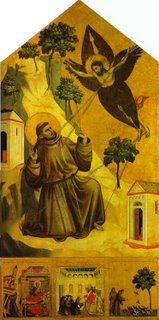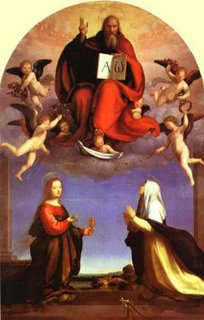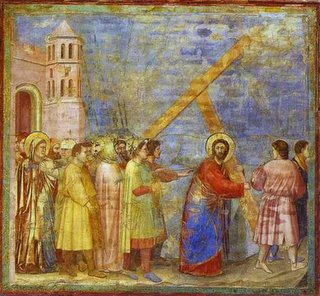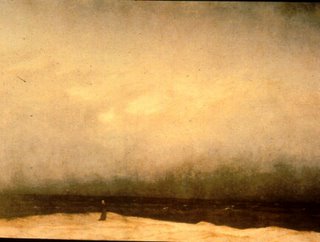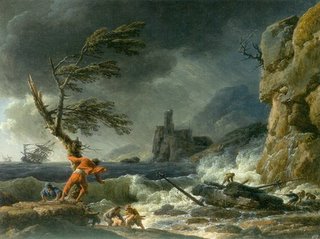
Beginning with the appearance of the Lioness and remaining until stanza 31, which is the start of the final doxology, the poem
The Wreck of the Deutschland stands still in eloquent contemplation of the Tall Nun and her Voice!
Stanza 18 is almost a tease, a clever Oxford-common-orom chat. The poet has already addressed the “lioness” and the “prophetess”—and now he calls her a “heart” at the same time. But he teases us—no, he’s not addressing the Nun only but also his own heart: thus the seemingly flippant manner, so wildly seemingly inappropriate for the storm, the wreck, and the martyrdom, but still iconic of holy wit: “Ah, touched . . .are you! Turned . . .have you! Make words . . .do you!” The link, of course, between the Nun and his heart is the man-woman relationship both within the created human personal soul—each person as a person sharing in the fundamental androgyny of humanity, split by gender into Eve & Adam—and between God and the person —we all being feminine before the divine masculine. (This interior androgyny, with reason and imagination, with an interior father and interior mother, is well explored in Hopkins’ poem dedicated to Robert Bridges, “To R.B.”) This whole stanza is particularly dense and difficulty, seemingly unfitting to the context—a witty puzzle juxtaposed to the tragic tale and the invitation to “a madrigal start.” And one of the phrases is seemingly inexplicable—“O unteachably after evil”—perhaps Hopkins referring to his own sinfulness, or at least the moral ambiguity of his poetry-making in his own eyes. But the ambiguity of what the text means at all is predominant: the words all through could refer both to the Nun and also to the poet—linked at “mother of being in me, heart”. The poet expresses an alarm, a surprise that causes both tears and a madrigal: something pent up is being release: “ . . .such a melting, a madrigal start!/Never-eldering revel and river of youth,/What can it be, this glee? The good you have there of your own?”
Perhaps we might unlock the puzzle of this dense stanza (and the whole poem) if we remember that it is telling a tale on three levels---
---
the literal tale of the actual wreck of the ship The Deutschland, and the drowning of the Nuns, and the heroic call of the Tall Nun
---
the allegorical tale of modern Europe, of the West in wreck, of Germany in particular as the country of rebellion against God, of the attempt to destroy the Church, of the witness of modern Christians
---
the moral tale of the interior life of Hopkins the poet himself, both as an artist and as a Christian, which seems to be most of all the poem’s concern, given the lengthy Part One which is a Principle and Foundation of the Spiritual Exercises of the whole
And to this we might add (though not fully yet, because we haven’t finished reviewing
The Wreck of the Deutschland in detail) there is a fourth level—
an analogical level, which draws the literal story, the allegory of the West, and the personal moral spirituality, all up, up, up into the revelation of the Heavenly reality of the inner life of God the Holy Trinity.
I do think Hopkins indeed intended all these levels, and stanza 18 is the real heart of the puzzle. Perhaps this is best demonstrated by the fact that stanza 18, this enigmatic crux of the poem, is actually the central stanza between stanza 1 and the final stanza 35. No wonder it is a mystery, a question, a strangeness, the place of the intersection of all the ways of reading the poem. It’s the one place in the poem where we don’t really know where we are, where, who, how, what, or when we are. It is the crux of the analogous imagination. And—to risk more complexity—it’s the moment when the poet actually speaks of being so moved as to pen a poem, to utter and to arrange utterances.
Ah, touched in your bower of bone
Are you! turned for an exquisite smart,
Have you! make words break from me here all alone,
Do you!—mother of being in me, heart.
O unteachably after evil, but uttering truth,
Why, tears! is it? tears; such a melting, a madrigal start!
Never-eldering revel and river of youth,
What can it be, this glee? the good you have there of your own?



